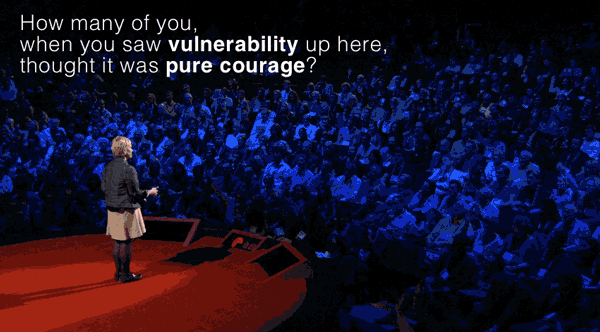I think that everyone should watch, at least once, both Brené Brown’s talks in sequence: The Power of Vulnerability and Listening to Shame, that is a splendid follow up, showing with direct experience what the first talk means.
There are loads of passages to quote and comment, over and over, but there are a few that at this moment in time stand out more to me:
Vulnerability is the birthplace of innovation, creativity and change. To create is to make something that has never existed before. There’s nothing more vulnerable than that. Adaptability to change is all about vulnerability.
This is simple: you need to make yourself vulnerable when you create something new, because you need to get out of the box of safety you built. It’s in a sense surprising (also in terms of self-reflection) that these two kinds of vulnerability are seen as different. Like that box you have to get out from isn’t a defence to not feel vulnerable. They are the same box.
Myshkin Ingawale said, “I saw this need. So you know what I did? I made it.” And everybody just burst into applause, and they were like “Yes!” And he said, “And it didn’t work. And then I made it 32 more times, and then it worked.”
Because it’s easy to think of creativity as some talent that someone has and some other hasn’t. But it’s not, vulnerability and creativity are tied in, and working on it, iterating, is key. “I made it 32 more times and then it worked”. How powerless makes you failing 32 times? How vulnerable are you in saying that? How does that impact the next person that wants to give you your next job?
There’s a huge difference between shame and guilt. And here’s what you need to know. Shame is highly, highly correlated with addiction, depression, violence, aggression, bullying, suicide, eating disorders. And here’s what you even need to know more. Guilt, inversely correlated with those things. The ability to hold something we’ve done or failed to do up against who we want to be is incredibly adaptive. It’s uncomfortable, but it’s adaptive.
Brown makes also a great distinction between guilt and shame. She says:
- Shame is “I am bad”
- Guilt is “I did something bad”
And that’s not a small difference. Separating acting and being is incredibly hard, both toward ourselves and toward others, even more in a culture like the western one (and even more in my experience for the anglo-saxon one – USA and UK) where “doing” is the only way we measure ourselves.
For men, shame is one, do not be perceived as what? Weak. … “They’d rather me die on top of my white horse than watch me fall down. When we reach out and be vulnerable we get the shit beat out of us”.
This, especially this, hits straight in the middle of my own shame. So much I have to stop writing for a second this very sentence. Also I feel that different people react to this in different ways. The way my ego reacted to this was to build an internal voice that is violent. Aggressive. And that, in one way or another, is unfortunately also the main reason I achieved so much I have achieved, and this last thing is what makes so difficult for me to let it go. To stop that violent side to shout “The hell with that, I’ll demonstrate I’m not weak, f**k you!”. That violence can achieve a lot unfortunately: Unfortunately because it also has a great cost in terms of social relations.
And of course, it’s not just me. Brown toward the end says the 4 main traits for women and the 4 main traits for men on how to conform to their gender norm, from a research done by Mahalik at Boston College:
- Women: nice, thin, modest, use all available resources for appearance.
- Men: show emotional control, work is first, pursue status, violence.
Yep. These four are exactly on spot. And see? Violence. There. I’m perfectly prototypical. And I don’t know why, but while I’m relatively jaded in terms of emotional control, work is first and pursue status, violence really stands out to me in the way I perceive it for myself, and in the way I perceive it in others. I can see emotional control, work, status in others and don’t blink an eye. But even the slight and unconscious glimpse of violence, and I notice it like it was a sledgehammer.
I’m noting this down mostly for myself, but I hope that it can give something back to you too. I’m surely not an example to take in showing myself vulnerable, but I’m working on it.
